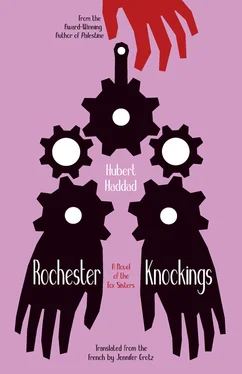If my dear Lee had been a Negro, the people of Rapstown would’ve had more than one occasion to put a rope around his neck. Tears come now just from thinking of him. Lee and I had promised to write each other every day. My letters were scented with lavender and decorated with petals. I grew tired after a week: there was nothing in return, not a single word. I dream of Lee almost every night. How can I describe him? He’s blond and tan from the sun, with brown eyes, a spice-colored mixture. In my dream, we’re riding bareback on a blazing thoroughbred and, impossibly, both of us are holding on by its long mane as if seated side by side. The stallion gallops so fast that it catches up with the setting sun and, suddenly, as if our mount were disappearing into a precipice, it’s Lee metamorphosed in flight that I’m astride. I feel that soon, in a convulsion, we are going to melt into each other, rider and mount, and that we will reach the sun while crying out our joy. At that final moment, I wake up in a sweat with a feeling of happiness mixed with dissatisfaction. What could a dream like that mean?
Tonight the old bones of this house are creaking. Undoubtedly because of the north wind. The north wind seeps in between the boards in the walls and in the cracks in doors and windows, it rushes down the chimney flue. It also causes sudden death, they say. Especially in autumn. It’s the great sweeper away of leaves and souls. Disturbed by its howling, Katie talked in her sleep. She was saying something about a devil with a cloven foot. And then she started to sing in a soft funny voice:
Oh! it’s a boy!
Super! it’s a boy
It’s a leprechaun, it’s a demon!
III.From a Drinker’s Point of View in the Saloon Across the Street
In the sole company of a whiskey bottle, Robert McLeann, the Hydesville marshal, was celebrating the departure toward the Great Lakes of a band of bounty hunters, headed up the trail of the famous “Underground Railroad,” as they call the rescue and support network of fugitive slaves from the southern states to the Canadian border. These thugs didn’t hesitate to recuperate their losses with the free Negroes of the Union entirely capable of proving their emancipation before underhanded judges who were paid ten dollars a head. There was a barn that served as a “station” on the side of the reservoirs. But the family of eight kids and three wives hidden there by Mormon pioneers, themselves escaped from the Missouri killings, had managed to take the marked trails to other shelters, while the Mormons in their turn went to the port of New York like their predecessors from the Brooklyn, in the vain hope of reaching, via Cape Horn, the other side of the Rocky Mountains. To the marshal, hostile to this absurd law of compromise passed by Congress, there was no question of giving the least service to the slave hunters on his piece of land. He already had enough to handle with passing adventurers, the continual stream of starving immigrants in search of Eden, ruined families returning from the West or Indian killers converted into arms traffickers.
At the hour when the hills of the Iroquois disappear beneath the fog, the October sun finished reddening alongside the brick and wooden façades and in the dust stirred up by carts returning from the fields. From his office window, head foggy from alcohol, McLeann saw Mr. Fox get off his horse, fasten it to the ramp above the drinking trough, and proceed to limp into the saloon. Both man and horse were thirsty. He could see the rider’s beleaguered air and remembered the previous renter of the farm by the pond, old Weekman, who walked every night to the bar in an uneven step. That ex-buffalo hunter turned farmer who, after settling down beside Long Road, after the death of his wife, and then after several years with no other worries, had developed jaundice two or three times, as well as tachycardia, acute attacks of goose bumps, and the accelerated whitening of his hair. At the bar, in no hurry to get back home, he told of his troubles as a lonely widower: something inconceivable had happened, the house itself was calling for his attention with little noises and intimate movements, creaking from top to bottom at night and flickering faint lights in the thick dark. Weekman ended up sleeping in the barn with his animals; he didn’t go back into the house until morning in order to wash and eat. Fright had transformed him; he weirdly began to resemble his horses, with a long face, rolling eyes, terrorized by the least thing. Finally he decided to leave Hydesville with his belongings and the exhumed coffin of his wife.
The marshal struck a match to relight the end of his cigar. In his line of work, instilling fear in people would be rather advantageous, it would keep them a little quieter. Civil peace consists essentially of not meddling in others’ affairs; a nice collective dose of being scared stiff would help his sleep as well as that of his fellow citizens. However there was nothing worse — the most dangerous thing for maintaining public order — than an excess of fear, above all fear of the unknown, which worked secretly on men and women who huddled around the same steeple, despite their mutual malice, all ready to turn the panic they feel toward each other onto the first being to come along, provided that it’s not from their own flock. McLeann had not failed, on occasion, to learn from some bitter experiments. For example that cursed day when he was unable to prevent the collective murder of a young Mohawk girl, a runaway for some unclear reason from the reservation on the side of the Lake of Two Mountains. This heavenly girl had a devilish beauty working against her in addition to the circumstances: a typhus epidemic was hitting the recently landed Irish immigrant families. Tied to two sticks in the form of a cross, the Indian girl was burned alive at the bottom of a gravel pit and then buried under three meters of sand. The famine fevers did not come back to the Puritans. Under the pretext of possession and evil spirits, they had hung former slaves by the dozens, they had crushed them under rocks, like at Salem on the Massachusetts Bay a little over a century ago. Police decrees these days were needed to prevent the excesses of faith as much as those of vice or corruption.
The marshal examined the WANTED notices pinned to his wall: horse thieves, weapons dealers, murderers. All of them deserved penal servitude or the rope, but one would feel safer among them than in the middle of a crowd of fine people incited by one of these preachers of the apocalypse come from Europe or one of the big cities. On one of the posters, the name William Pill caught his attention in particular. He remembered a swindler named Willie the Faker who had settled on his spur tips in Hydesville, ready to graze from the purse of someone who was more than a weaner of calves. The gambit was only a stopgap for him between two major swindles. One night, after the bar closed, Pill had come to the jail to seek protection: farmers armed with clubs and equipped with a strong rope had more than one account to settle with him. Sheltered behind bars, the man was quick to share confidences, true or false, as a way to pass the time. Big and solid, with a beautiful pockmarked face that a lock of blond hair swept across with every movement of his chin, this William Pill had the gift for shooting the breeze and even a certain spirit about him. He claimed to have been a sentry box officer, a commercial agent, a pharmaceutical representative and several other things in his past lives. He was one of those rather pleasant unscrupulous adventurers who hung around bars and churches. Tonight, while a crowd of parishioners were lighting torches, Marshal McLeann asked himself real questions about his own legitimacy: by comparison, outlaws caused significantly less damage than the public damages of good people. Was a jail good for anything more than to protect the supposedly reprehensible citizens from the supposedly good citizens who might be having a hard time respecting the Sixth Commandment?
Читать дальше












